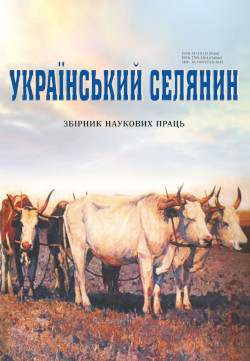Ukrainian steppe in the memoirs of the English entrepreneur George Hume
Main Article Content
Abstract
The purpose of this research is to study George Hume’s memoirs as a foreign perspective on of the South
Ukrainian region in the latter half of the 19th century, determining the potential for obtaining information for studying the
history of Southern Ukraine during the period of post-reform modernization.
The novelty of this research is determining how the realities of life in the steppe Ukraine in the latter half of the 19th
century are reflected in the memoirs of the English entrepreneur, taking into account that they are a piece of historical and
literary writing about Ukraine on the one hand, and a source of personal experience on the other.
Conclusions. The South Ukrainian steppes in the memoirs of G. Hume are presented as a combination of natural and
human factors, social and economic relations that are closely intertwined with each other. Hume’s words generally coincide
with information from other sources used in modern research. First and foremost, undoubtedly, it was entrepreneurial activity
since this was the author’s main goal. Nature-related topics are also closely connected with his business interests: the author
emphasizes the need for effective exploitation of the fertile black land. The vivid essays about his business partners, estate
owners, peasants, and Mennonite Germans are an integral part of the memoirs. A keen interest in people is combined with
amiability, which reveals itself throughout. At the same time, the narrative is imbued with value judgments common for a
representative of the European (British) society, which are based on the following antithesis: talented people versus a backward,
inefficient state. The author writes with great sympathy about local (Ukrainian) peasants, emphasizing their abilities that had
not been properly developed due to lack of education.
Given this, it is logical that one of the main ideas of the memoirs is the author’s civilizational mission which was carried
out not only through the promotion of “labor-saving machines”, but also through the introduction of the “Eastern people” to
the benefits of civilization
Article Details

This work is licensed under a Creative Commons Attribution 4.0 International License.
References
Desiatnikov, I. (2011). Reforma 1861 r. ta formuvannia vyrobnychykh vidnosyn u silskomu
hospodarstvi Ukrainy. [The reform of 1861 and the formation of industrial relations in the agriculture of Ukraine.]. Problemy istorii Ukrainy XIX - pochatku XX st. [Problems of History of Ukraine
in 19th – Early 20th Centuries], 18, 78–84. [in Ukrainian].
Farenii, I. (2011). Selianske hospodariuvannia v systemi tovarno-rynkovykh vidnosyn
poreformenykh desiatylit. [Peasant management in the system of commodity-market relations of
the post-reform decades]. Problemy istorii Ukrainy XIX – pochatku XX st. [Problems of History of
Ukraine in 19th – Early 20th Centuries], 18, 163–171. [in Ukrainian].
Hume, G. (1914). Thirty-Five Years in Russia. London: Simpkin, Marshall, Hamilton, Kent
& Co., LTD. [in English].
Mironova, I. (2016). Nimetska kolonizatsiia Pivdennoi Ukrainy XVIII – XIX st.: periodyzatsiia problemy. [German colonization of Southern Ukraine 18 – 19th centuries: periodization of
the problem]. Istorychnyi arkhiv. [Historical archiv], 16, 81–87. [in Ukrainian].
Nalyvaiko, D. (1998). Ochyma Zakhodu: Retseptsiia Ukrainy v Zakhidnii Yevropi ХІ –
ХVIII st. [Eyes of the West: Reception of Ukraine in Western Europe of the 11th–18th century].
Kyiv: Osnovy. [in Ukrainian].
Piatnytskova, I. & Otzemko, О. (2022). Promyslovyi postup Donbasu za memuaramy
inozemtsiv (druha polovyna XIX – pochatok XX st.). [Industrial Progress of Donbas in Memoirs of
Foreigners (second half of the 19th – the beginning of the 20th century)]. Eminak. [Eminak], 3(39),
–65. [in Ukrainian].
Prysiazhniuk, Yu. (2019). Ukrainske selianstvo Pivdnia Ukrainy yak ob’iekt etnolohichnykh
studii (na materialakh spohadiv Ye. Chykalenka). [Ukrainian peasantry in Southern of Ukraine as
an object of ethnological studies (based on Yevhen Chykalenko’s memories]. Ukrainskyi selianyn.
[Ukrainian peasant],22, 56–61. [in Ukrainian].
Prysiazhniuk, Yu. (2022). Ukrainskyi selianyn periodu kryzy kriposnoho prava (shtrykhy
mentalnoho portretu). [Ukrainian peasant during the crisis of serfdom (strokes of the mental portrait)]. Visnyk Cherkaskoho universytetu. Seriia «Istorychni nauky». [ Cherkasy University Bulletin: Historical sciences], 1, 61–68.
Rak, J. (2004). Are Memoirs Autobiography? A Consideration of Genre and Public Identity.
Genre, 36, 305–326. [in English].
Reient, O. & Serdiuk O. (2011). Silske hospodarstvo Ukrainy i svitovyi prodovolchyi rynok
(1861–1914 rr.). [Agriculture of Ukraine and the World Food Market (1861–1914)]. Kyiv: In-t
istorii Ukrainy. [in Ukrainian].
Temirova, N. (2002). Materialno-tekhnichne zabezpechennia pomishchytskykh hospodarstv Ukrainy naprykintsi XIX – na pochatku XX st. [Material and technical support of landlord
farms of Ukraine at the end of the 19th – at the beginning of the 20th century]. Naukovi pratsi:
Naukovo-metodychnyi zhurnal. Istorychni nauky. [Scientific and methodical journal. Historical sciences], (Vyp.4, 83–87). Mykolaiv: MDHU im. Petra Mohyly. [in Ukrainian].
Temirova, N. (2003). Pomishchyky Ukrainy v 1861–1917 rr.: sotsialno-ekonomichna evoliutsiia [The landowners of Ukraine in 1861–1917: socio-economic evolution]. Donetsk: DonNU.
[in Ukrainian].
Vasylchuk, I. (2015). Pershi nimetski kolonii na Pivdni Ukrainy (kinets XVIII – XIX st.).
[First German ñolonies on South of Ukraine (the end of the XVIII – XIX)]. Muzeinyi visnyk. [Museum Bulletin], 2, 60–68. [in Ukrainian].

